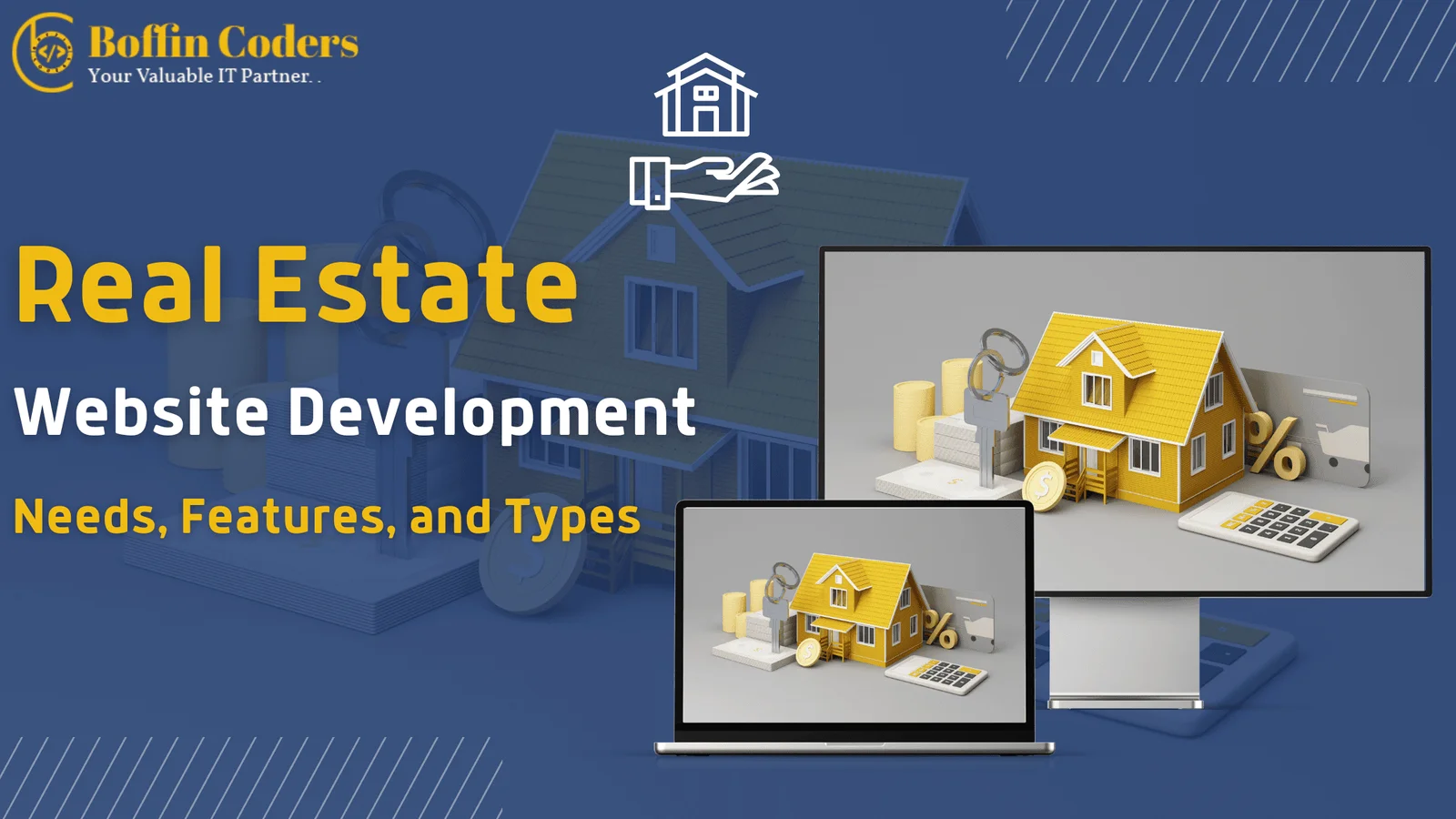In today’s digital age, having a well-designed and user-friendly real estate website is essential for any real estate business. A good website can help you attract new leads, showcase your listings, and close more deals.
But before you start developing your website, it’s important to understand the must-have features, costs, and timeframes involved. In this blog post, we’ll cover everything you need to know to get started.
To make your real estate website profitable for your business, it is essential to ensure that it meets user expectations, performs at a high level, and remains competitive. With our top-notch real estate website development services, we can help you achieve these goals and take your business to the next level.
Why choose a custom-built website for your real estate business?
A custom-built website is important for a real estate business for several reasons. Firstly, it allows you to showcase your brand in a unique and professional way, making you stand out from your competitors. According to a study by the National Association of Realtors, 50% of buyers found their homes online, indicating that having a website that is easy to navigate and visually appealing can significantly impact your business’s success.
Secondly, a custom-built website allows you to tailor your user experience to your target audience’s specific needs, making it more likely that they will engage with your website and, ultimately, your business. This tailored approach can lead to increased website traffic, higher lead generation, and ultimately, more sales. For example, a real estate company in New York, Halstead, reported that its custom-built website generated 45% of its total leads.
Lastly, a custom-built website is often faster and more efficient than a template-based site. This improved speed can lead to better search engine optimization (SEO) and improved user experience, resulting in higher rankings on search engines like Google and increased traffic to your site. According to Google, websites that load in five seconds or less have 70% longer average sessions, indicating the importance of a fast-loading website for user engagement.
5 Types of Real Estate Websites
1. Property Listing Websites:
These websites allow users to search and browse through listings of available properties. Examples include Zillow, Redfin, and Realtor.com.
2. Agency Websites:
These websites showcase a real estate agency’s services, team, and properties. They often feature listings of properties exclusively represented by the agency. Examples include Sotheby’s International Realty and Keller Williams.
3. Brokerage Websites:
These websites are similar to agency websites, but they represent a brokerage firm rather than a single agency. They often offer a range of real estate services, such as property management and appraisals. Examples include Coldwell Banker and Century 21.
4. Real Estate Investment Websites:
These websites focus on providing information and resources for real estate investors, such as market analysis and investment opportunities. Examples include BiggerPockets and Fundraise.
5. Real Estate News and Media Websites:
These websites offer news, insights, and analysis on the real estate industry. Examples include Inman News and Real Estate News Exchange (RENX).
Must-Have Features for a Real Estate Website
There are a few key features that every real estate website should have. These include:
1. Search Function
A search function is essential for any real estate website. It allows users to easily find listings by location, price, and other criteria. The search function should be easy to use and should return relevant results.
2. Property Detail Page
Each listing should have a dedicated property detail page. This page should include photos, a description, a map, and contact information. The property detail page should be detailed and informative, and it should provide users with everything they need to know about the property.
3. Blog or News Section
A blog or news section is a great way to provide valuable information to potential buyers and sellers. The blog or news section can be used to share tips on buying and selling property, as well as news about the local real estate market.
4. Contact Form
A contact form is essential for any real estate website. It allows users to get in touch with you if they have any questions or if they would like to schedule a showing. The contact form should be easy to use and should be prominently displayed on the website.
5. Mobile-Friendly Design
More and more people are using their mobile devices to browse the internet. It is important to make sure that your website is mobile-friendly. The design must be visually appealing and user-friendly across all devices, including smartphones and tablets.
Additional Features
In addition to the essential features listed above, you may also want to consider adding other features to your real estate website. Some popular additional features include:
1. Property Search:
Include a robust search function that allows users to filter and search for properties based on criteria such as location, price range, property type, number of bedrooms, and amenities.
2. Interactive Maps:
Integrate maps and geolocation features to display property locations accurately. Users can visualize properties in their desired areas and explore nearby amenities.
3. Property Listings:
Provide a user-friendly interface to display detailed property listings. Include essential information such as property description, price, location, features, high-quality images, and virtual tours if available.
4. Advanced Filters:
Offer advanced filtering options to help users refine their property search further. Filters can include property size, year built, specific amenities, property condition, and more.
5. Saved Searches and Alerts:
Allow users to save their search criteria and set up email alerts to receive notifications when new properties that match their preferences are listed.
6. Agent Profiles:
Showcase real estate agents or agencies with individual profiles highlighting their experience, expertise, and contact information. This helps users connect with the right agents for assistance.
7. Mortgage Calculator:
Include a mortgage calculator tool that allows users to estimate monthly mortgage payments based on property price, down payment, interest rate, and loan term. This helps users evaluate affordability.
8. User Reviews and Ratings:
Enable users to provide feedback and reviews on properties they have visited or worked with real estate agents. This feature helps establish credibility and trust among potential buyers or sellers.
9. Featured Properties:
Highlight a selection of featured properties on the homepage or dedicated sections to grab users’ attention and showcase attractive listings.
10. Property Comparisons:
Provide a side-by-side property comparison tool that allows users to compare multiple properties based on various attributes, such as price, size, location, and features.
11. Social Media Integration:
Allow users to share properties they like on social media platforms, facilitating word-of-mouth marketing and increasing exposure for listed properties.
12. Mobile Optimization:
Ensure the website is fully optimized for mobile devices, providing a seamless user experience across smartphones and tablets.
13. Contact Forms and Inquiries:
Include contact forms or inquiry forms on property listings, making it easy for users to reach out to real estate agents or property owners for more information or to schedule viewings.
14. Neighborhood and Amenities Information:
Provide detailed information about neighborhoods, nearby schools, healthcare facilities, transportation options, and other amenities to help users evaluate the overall suitability of a property.
15. Language and Currency Localization:
If targeting international audiences, offer language localization options and currency conversions to provide a personalized experience for users from different regions.
Remember, the specific features you choose will depend on your target audience, business requirements, and the scale of your real estate website. It’s crucial to prioritize features that align with your user’s needs and provide a seamless browsing and property search experience.
Why choose WordPress for your real estate website development?
WordPress is an affordable option for real estate businesses looking to build a website, as it is an open-source platform that offers a range of free and low-cost templates, themes, and plugins. This allows businesses to create professional-looking websites without having to invest significant resources in web development.
Additionally, WordPress offers a user-friendly content management system (CMS) that allows businesses to easily update and manage their website’s content, such as property listings, photos, and descriptions. This can save time and resources in the long run, as businesses can make changes to their website without having to rely on a web developer.
WordPress also offers a range of SEO plugins that can help businesses improve their website’s visibility on search engines like Google, which can be crucial for driving traffic and generating leads.
Overall, WordPress is a cost-effective and efficient option for real estate businesses looking to build and manage their website without breaking the bank.
I hope this blog can be helpful for you to understand the need for a website in the real estate business. If you’re looking to take your real estate business online, don’t hesitate to hire real estate website developers. Ask us if you still have any doubts, we’re available for free consultation. Our experts will help you set up your business online.




